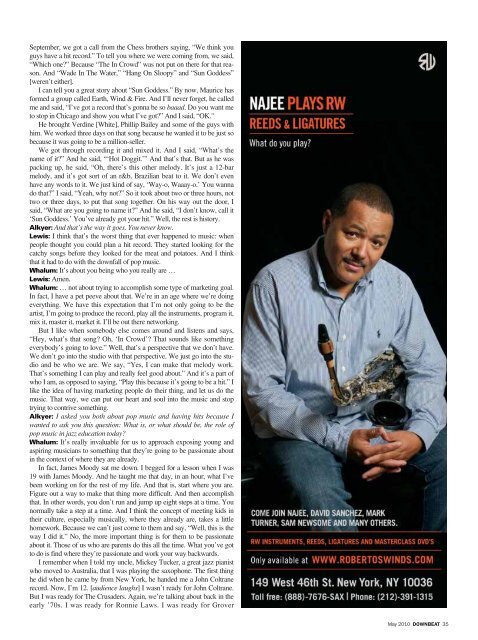Download - Downbeat
Download - Downbeat
Download - Downbeat
- No tags were found...
Create successful ePaper yourself
Turn your PDF publications into a flip-book with our unique Google optimized e-Paper software.
September, we got a call from the Chess brothers saying, “We think youguys have a hit record.” To tell you where we were coming from, we said,“Which one?” Because “The In Crowd” was not put on there for that reason.And “Wade In The Water,” “Hang On Sloopy” and “Sun Goddess”[weren’t either].I can tell you a great story about “Sun Goddess.” By now, Maurice hasformed a group called Earth, Wind & Fire. And I’ll never forget, he calledme and said, “I’ve got a record that’s gonna be so baaad. Do you want meto stop in Chicago and show you what I’ve got?” And I said, “OK."He brought Verdine [White], Phillip Bailey and some of the guys withhim. We worked three days on that song because he wanted it to be just sobecause it was going to be a million-seller.We got through recording it and mixed it. And I said, “What’s thename of it?” And he said, “‘Hot Doggit.’” And that’s that. But as he waspacking up, he said, “Oh, there’s this other melody. It’s just a 12-barmelody, and it’s got sort of an r&b, Brazilian beat to it. We don’t evenhave any words to it. We just kind of say, ‘Way-o, Waaay-o.’ You wannado that?” I said, “Yeah, why not?” So it took about two or three hours, nottwo or three days, to put that song together. On his way out the door, Isaid, “What are you going to name it?” And he said, “I don’t know, call it‘Sun Goddess.’ You’ve already got your hit.” Well, the rest is history.Alkyer: And that’s the way it goes. You never know.Lewis: I think that’s the worst thing that ever happened to music: whenpeople thought you could plan a hit record. They started looking for thecatchy songs before they looked for the meat and potatoes. And I thinkthat it had to do with the downfall of pop music.Whalum: It’s about you being who you really are …Lewis: Amen.Whalum: … not about trying to accomplish some type of marketing goal.In fact, I have a pet peeve about that. We’re in an age where we’re doingeverything. We have this expectation that I’m not only going to be theartist, I’m going to produce the record, play all the instruments, program it,mix it, master it, market it. I’ll be out there networking.But I like when somebody else comes around and listens and says,“Hey, what’s that song? Oh, ‘In Crowd’? That sounds like somethingeverybody’s going to love.” Well, that’s a perspective that we don’t have.We don’t go into the studio with that perspective. We just go into the studioand be who we are. We say, “Yes, I can make that melody work.That’s something I can play and really feel good about.” And it’s a part ofwho I am, as opposed to saying, “Play this because it’s going to be a hit.” Ilike the idea of having marketing people do their thing, and let us do themusic. That way, we can put our heart and soul into the music and stoptrying to contrive something.Alkyer: I asked you both about pop music and having hits because Iwanted to ask you this question: What is, or what should be, the role ofpop music in jazz education today?Whalum: It’s really invaluable for us to approach exposing young andaspiring musicians to something that they’re going to be passionate aboutin the context of where they are already.In fact, James Moody sat me down. I begged for a lesson when I was19 with James Moody. And he taught me that day, in an hour, what I’vebeen working on for the rest of my life. And that is, start where you are.Figure out a way to make that thing more difficult. And then accomplishthat. In other words, you don’t run and jump up eight steps at a time. Younormally take a step at a time. And I think the concept of meeting kids intheir culture, especially musically, where they already are, takes a littlehomework. Because we can’t just come to them and say, “Well, this is theway I did it.” No, the more important thing is for them to be passionateabout it. Those of us who are parents do this all the time. What you’ve gotto do is find where they’re passionate and work your way backwards.I remember when I told my uncle, Mickey Tucker, a great jazz pianistwho moved to Australia, that I was playing the saxophone. The first thinghe did when he came by from New York, he handed me a John Coltranerecord. Now, I’m 12. [audience laughs] I wasn’t ready for John Coltrane.But I was ready for The Crusaders. Again, we’re talking about back in theearly ’70s. I was ready for Ronnie Laws. I was ready for GroverMay 2010 DOWNBEAT 35
















